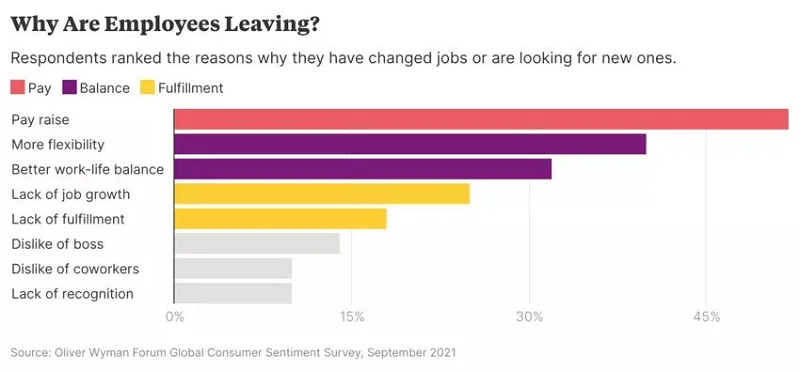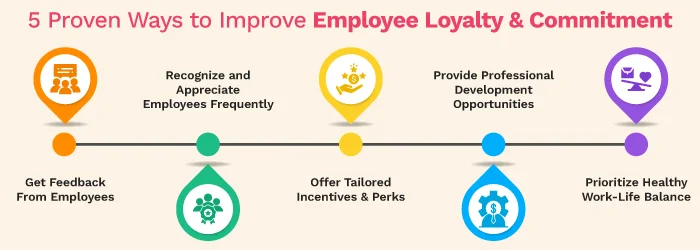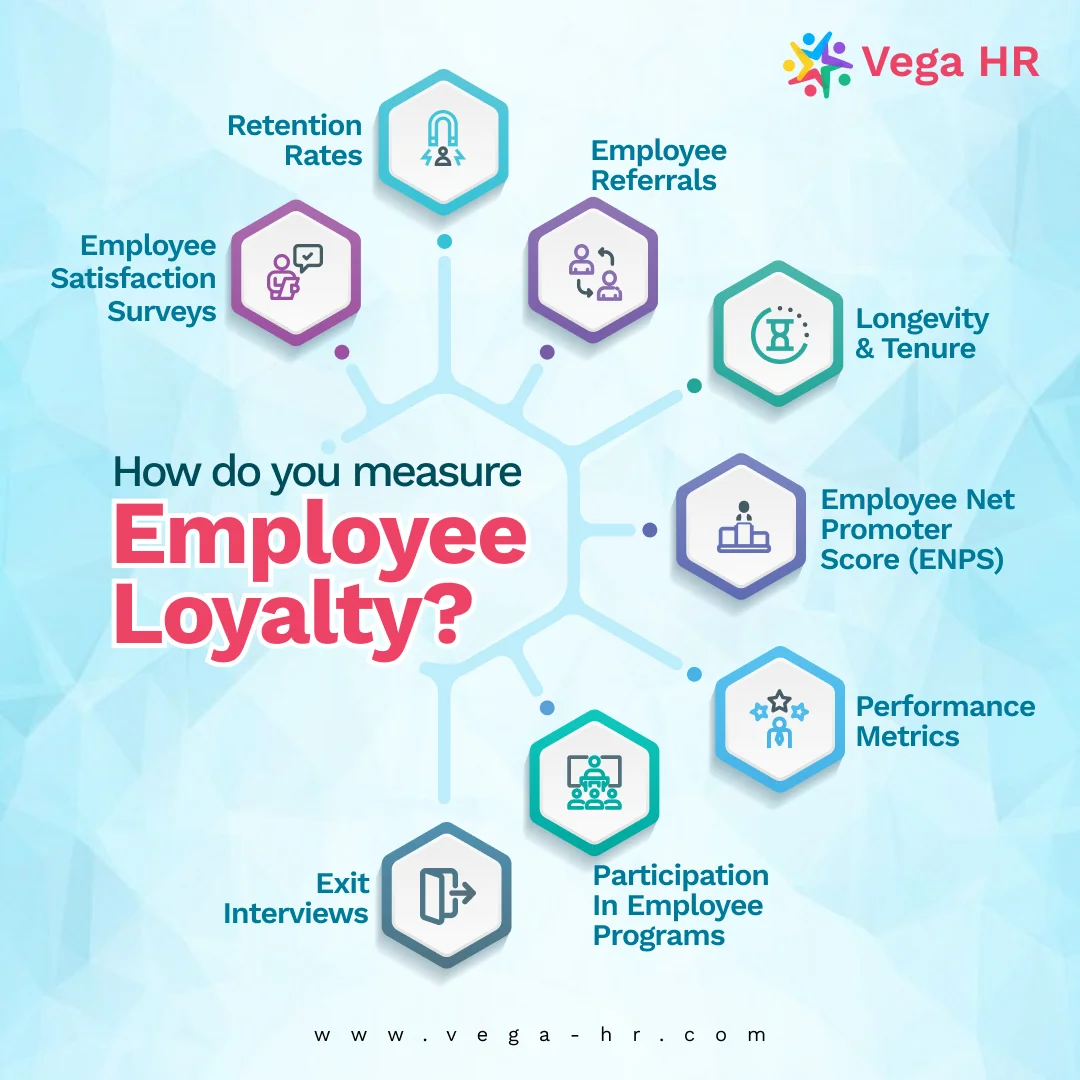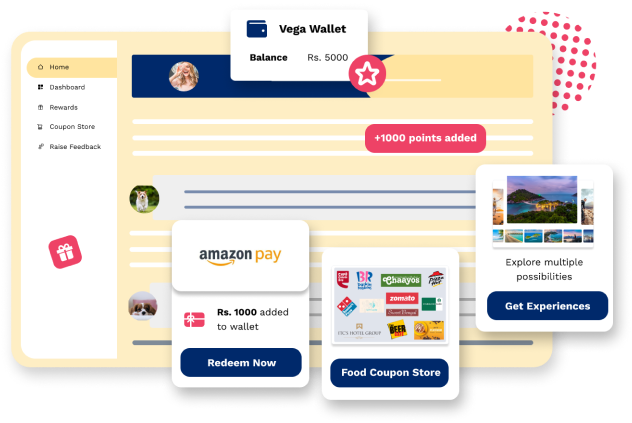In the wake of a recent BCG report revealing that 26% of Indians are deemed 'at risk' of leaving their jobs in 2024, an important but frequently neglected concern arises amidst the hustle – that of employee loyalty and commitment.
For a forward-thinking organization, the task at hand extends beyond merely providing timely salaries and occasional office celebrations to securing long-term dedication. But, can it be this straightforward? Certainly not!
Read on to explore everything about employee loyalty - understanding its significance, discovering proven methods to enhance it, and effective ways to measure its impact.
Let's start right away!
What Does Employee Loyalty Mean for an Organization?
“ Loyalty is traditionally underlined by a long service,” says Santosh Iyer, MD and CEO, of Mercedes-Benz India, but it can also be seen in short and efficient services. “We encourage exposure to multiple functions to develop a holistic understanding of the business. We equate value-driven contributions of an individual with loyalty… it’s not just about longevity,” he says.
That pretty much sums up employee loyalty. But, let’s dig a little deeper and familiarize ourselves with proven employee loyalty benefits for the company.
Benefits of investing in employee loyalty:
- Enhanced Productivity: Prioritizing employee loyalty fosters a positive work environment, boosting morale and commitment, leading to increased productivity. Happy and loyal employees can improve work productivity by up to 12%, leading to cost savings and fostering annual growth.
- Reduced Turnover Costs: Investing in the long-term loyalty of your company reduces turnover rates, saving on recruitment, training, and onboarding expenses while retaining institutional knowledge. The cost of replacing an employee may reach up to 33% of their yearly salary.
- Improved Customer Satisfaction: Loyal employees are more likely to provide excellent customer service, contributing to higher customer satisfaction and loyalty. In a survey done by Gallup, companies enjoy a 147% higher earnings per share versus their competitors, thanks to having happier employees.
- Strong Employer Brand: Demonstrating commitment to employee well-being enhances the company's reputation, making it an attractive and competitive employer in the market.
Now if you flip these very benefits, you’ll get the cost of low employee loyalty within the organization - low employee productivity, high turnover costs, and more. You don’t want these seeping into your organizational culture, right?
The expenses associated with employee turnover can be significantly high, with estimates suggesting that the departure of an employee may incur costs ranging from half to twice their annual salary for a company.
However, you might be curious as to why employees are switching. Here’s a recent statistic to address your question.

Source:hrforecast
Some reasons are surprising, aren’t they?
But, guess what? You can successfully improve employee loyalty with simple initiatives. Let’s check out some effective strategies.
5 Proven Ways to Improve Employee Loyalty & Commitment

Here are some proven ways you can incorporate to improve employee loyalty and commitment.
1. Get Feedback From Employees
In pursuit of boosting employee loyalty, implementing an open-door policy is key.
So encourage honest feedback from employees at all levels of the organizational hierarchy. Getting both lower-level and higher-level perspectives will prove valuable and provide a direct pathway to refining policies and ensuring a happy workforce. Take the initiative to inquire about processes that can be enhanced or rectified, creating an environment where employee voices are not only heard but also actively considered.
Moreover, as a leader, steer clear of micromanagement. Foster an effective leadership and management style that will help strengthen trust and loyalty within your team.
2. Recognize & Appreciate Employees Frequently
When it comes to employee loyalty, consistent recognition cannot be overstated.
Touch base with your team early and often, acknowledging their efforts and contributions. Implement a system of regular shout-outs in team meetings, highlighting individual achievements. Consider personalized notes or small tokens of appreciation as tangible reminders of their value. These simple yet powerful gestures encourage a positive work culture by fostering a sense of pride and loyalty among your team members.
You can deploy a tool like Vega HR that allows you to appreciate and celebrate your team via public shout-outs through our personalized social intranet. The employees will receive real-time mobile/desktop notifications for any employee engagement activity within the platform.
Apart from this, the platform enables you to measure employee sentiment and collect ongoing feedback seamlessly.
Also, with features like Happiness and Mood Index, Social Intranet, Peer to Peer Recognition, eNPS, Polls, and Quizzes, you can effectively enable a well-rounded employee experience with minimum effort.
3. Offer Tailored Incentives & Perks
To achieve trust and loyalty in the workplace, start by recognizing individual preferences in incentives.
Beyond traditional monetary perks, consider personalized options such as wellness benefits or remote work flexibility. Understand the unique needs of your team and tailor incentives accordingly. Whether it's extra vacation days or skill-building workshops, personalized perks showcase a commitment to your employees' well-being and growth. This thoughtful approach not only fosters loyalty but also creates a work environment where individuals feel valued and understood.
4. Provide Professional Development Opportunities
Fuel employee loyalty by investing in their continuous growth. Offer a spectrum of professional development opportunities, from workshops to online courses, tailored to individual career aspirations.
Encourage mentorship programs and attendance at industry events. Demonstrating a commitment to employees' career progression not only enhances their skill sets but also instills a sense of loyalty. By actively participating in their professional journey, you create a workforce that is not just committed but continuously evolving and contributing to the success of your organization.
Leading companies like Amazon and Schneider Electric have successfully integrated Training and Development Programs for their employees.
5. Prioritize Healthy Work-Life Balance
Enhance employee loyalty by championing a balanced life. Enable flexibility with work hours, acknowledging the diverse needs of your team.
Leverage insightful statistics to refine policies that foster the perfect sync between professional and personal spheres. Show a genuine commitment to job satisfaction by promoting reasonable workloads and discouraging overtime. Cultivating a workplace where individuals thrive both at work and in their personal lives not only enhances loyalty but also ensures a motivated team ready to tackle challenges with enthusiasm.
You know the strategies to implement now. But, to see how well these strategies are working, you also have to measure employee loyalty. How do you do it? Let’s find out next.
How Do You Measure Employee Loyalty?

Measuring employee loyalty is crucial for organizations seeking to understand the level of commitment and engagement among their workforce. Several key indicators can provide rich insights into the degree of loyalty within a company.
1. Employee Satisfaction Surveys
Conduct regular surveys to gauge employees' satisfaction with their roles, the work environment, and overall job experience. Feedback obtained through surveys can highlight areas of improvement and assess the general sentiment of the workforce.
2. Retention Rates
Track employee turnover rates over time. A low turnover rate indicates that employees are more likely to stay with the company, reflecting a higher level of loyalty.
Employee Retention Rate = (Total no. of remaining employees/ Total no. of original employees) ✕
3. Employee Referrals
The willingness of employees to recommend the organization to others can be a powerful measure of loyalty. Employees who feel positively about their workplace are more likely to refer friends or acquaintances for job opportunities.
4. Participation in Employee Programs
Engagement in company-sponsored programs, such as wellness initiatives, training programs, or volunteer activities, can signify a strong sense of connection and loyalty.
5. Performance Metrics
Assessing individual and team performance metrics can provide insights into employee dedication and effort. Consistent high performance may indicate loyalty and a strong commitment to achieving organizational goals.
6. Exit Interviews
Analyzing feedback obtained during exit interviews can reveal reasons for employee departures and shed light on areas where the organization can improve to enhance loyalty.
7. Longevity & Tenure
Examine the average length of service and tenure of employees within the organization. A longer average tenure often indicates a higher level of loyalty among the workforce.
8. Employee Net Promoter Score (eNPS)
Similar to the Net Promoter Score used for customer loyalty, the eNPS measures how likely employees are to recommend the organization as a good place to work. It provides a quantitative measure of employee loyalty.
eNPS = % of Promoters − % of Detractors
The formula is calculated by subtracting the percentage of employees who are detractors (unhappy or dissatisfied) from the percentage of employees who are promoters (happy or satisfied). The result provides a numerical representation of employee sentiment, with a higher eNPS indicating a more positive workplace environment.
Considering these indicators, organizations can develop a comprehensive understanding of employee loyalty and take targeted actions to enhance the overall employee experience and a loyal, motivated workforce.
Rounding Off
Employee loyalty and commitment serve as the sturdy pillars upon which a flourishing workplace stands. These qualities extend beyond mere job tenure, reflecting a genuine connection between employees and their organization.
So, actively acknowledge and reward achievements, encourage transparent dialogue, and place a premium on maintaining a healthy work-life balance. And you’re all set to sustain a happy and motivated workforce!
About Vega HR
Vega-HR is a powerful tool in the talent war, offering employee rewards, recognition, and pulse recognition. With an engaging platform, it fosters a world-class work culture, providing P2P recognition, social feedback, on-spot recognition, and monetizable incentive solutions with 3000+ coupons in various categories.
Create a Culture People Want to Stick to
- Send rewards
- Give shoutouts
- Build a community
- Gift experiences
Get a demo
 Written by Shubhika Sundriyal 01 February 2024 | 4 min read
Written by Shubhika Sundriyal 01 February 2024 | 4 min read







